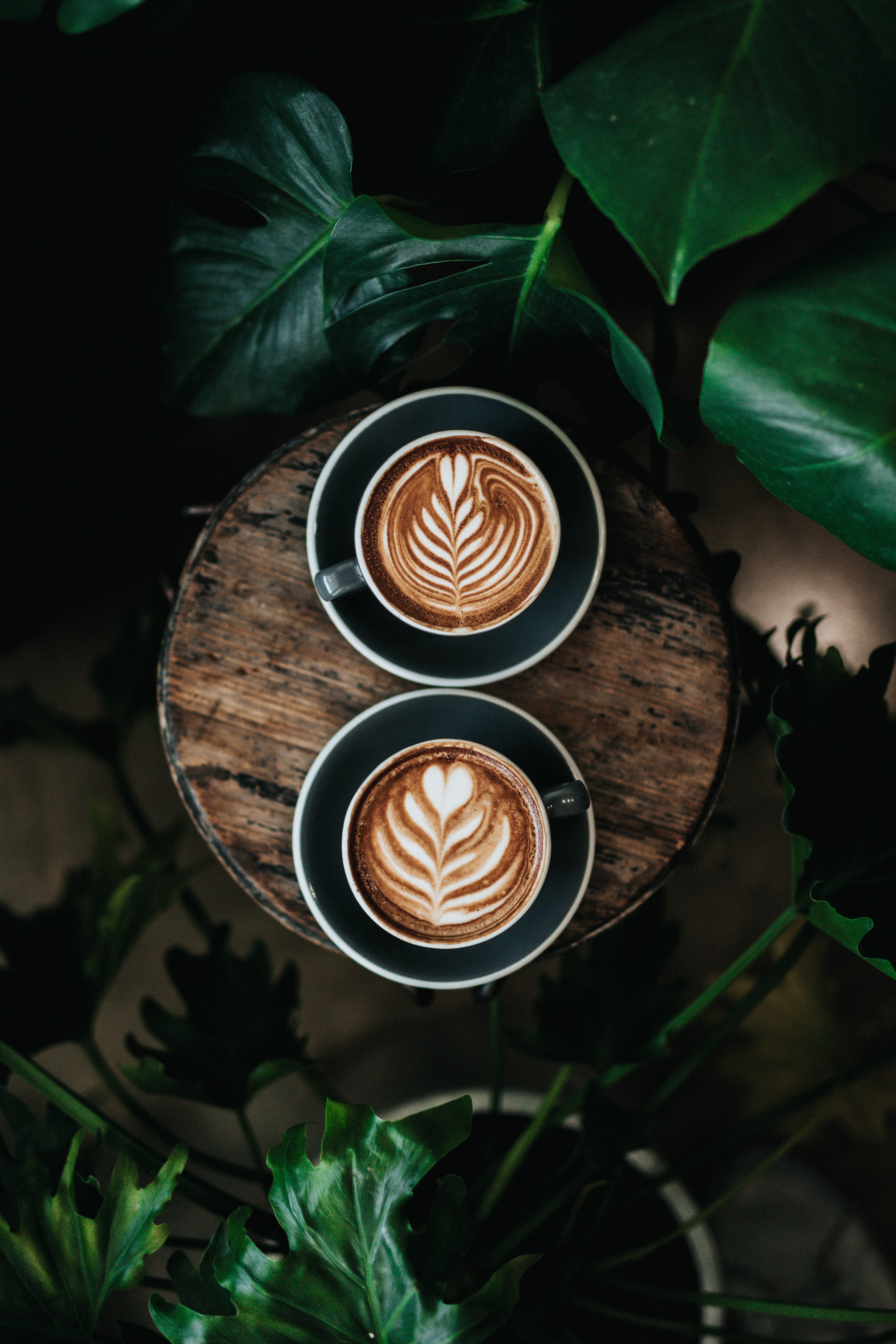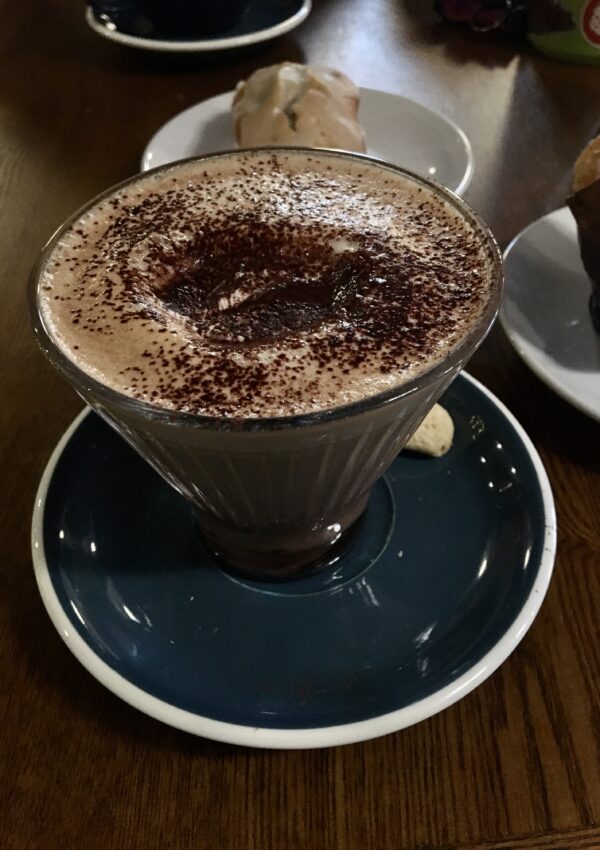In January I decided to stop drinking coffee, and the benefits to quitting caffeine were surprising.
The process had already started with my value-buy coffee getting stale and not being enjoyable enough for me to finish my one cup a day.
I had also started to notice a few things that made the decision easier.
Falling asleep at night had never been an issue for me before, but I had started to experience difficulty turning my brain off at night.
I had also just finished a book about hormones and adrenals and was looking to switch things up and give my system a break.
It couldn’t hurt to kick caffeine for a bit. Turns out, it did hurt (wow those caffeine headaches), but the benefits that followed were quite surprising.

Caffeine Withdrawals
Coming off of coffee was hard.
I skipped one day completely and was met with a horrible headache.
It was bad.
I had been addicted to coffee for going on 12 years.
I decided to gradually step my way to zero so I could continue to work and be productive through my withdrawal symptoms.
It went relatively smooth for the first couple of days until I fully relapsed at a friend’s house and had a pretty big cup of black coffee.
How was I supposed to be rude and say no to the offered coffee?
Bad move.
The next week was dominated by a ‘give me my half cup of coffee and no one gets hurt’ type of mood.
Clearly I was addicted. I didn’t like feeling so on edge and cranky. The headaches were something, but the feeling of needing caffeine had been exposed and I didn’t like it.
I decided I had to continue and get over this regardless of my body revolting.
My withdrawal symptoms included:
- Major headaches
- Less major headaches that lasted all day and into the night and following morning
- Feeling on edge
- Trouble focusing
- Feeling extremely drowsy in the afternoons
- Eye twitching
- Feeling cranky and frankly off balance
Timeline
It took me about 15 days to slowly wean off of caffeine.
That timeline started after a relapse where I drank a big cup of coffee and had to basically start over. I drank different teas with varying amounts of caffeine during the process.
Day 1- 3
The first couple of days, I drank half a cup of coffee a day and gradually made smaller and smaller amounts, until it almost wasn’t worth it.
Day 4 – 6
I pushed past the headaches and feeling on edge and moved to black tea (~50 mg. of caffeine) for a couple of days. The eye twitching was next level on black tea, for whatever reason.
I’m not sure if it was due to me brewing a cup with two tea bags the first day or the different method of caffeine consumption that caused my eye to twitch, but I was quickly ready to move on.
Day 7 – 9
I then moved to chai tea (~20 – 40 mg) for a couple days. Chai tea was my favorite coffee replacement. I experimented with adding milk or creamer here and there and overall enjoyed the flavor and little amount of caffeine I was getting.
Day 10 – 15
Next up was green tea (~25 mg) for another couple of days. Green tea almost didn’t make me notice the caffeine in it, but it also didn’t give me a headache when I switched from Chai.
I finally landed on decaffeinated herbal tea to replace my warm morning beverage.
Quitting caffeine can be done faster, of course, but I decided to take it easy and not have to spend an entire weekend with a massive headache.
I dealt with the initial withdrawal headaches and then one last lighter headache after finally switching to herbal tea. This approach made the headaches much more manageable and it allowed me to deal with the other frustrations of feeling off balance and extremely drowsy and unfocused in the afternoons.
Benefits to Quitting Caffeine
Quitting caffeine has brought about more benefits than I could have ever imagined.
I had no way of knowing how much my daily caffeine intake played a role in how I felt day to day. It had been part of my day to day for the past 12 years after all, so naturally getting off of caffeine brought about a whole new normal for me.
The main benefits:
- I fell asleep easier
- I woke up more rested
- My stomach was less sensitive
- I was less high strung and felt more calm overall
- I wasn’t as easily frustrated
- I had more capacity to be kind to myself
Quality of Rest and Early Mornings
The most prominent benefit to me was the quality of rest I was getting.
Without coffee, I’d naturally get tired by 8:30 – 9:00 p.m. and be ready to go to bed instead of being wired until 10:30 – 11:30 pm.
It was easier to fall asleep and I was also enjoying better, more restful sleep.
I noticed this most because I like to get up between 5:00 and 5:20 a.m. to write.
Usually my ‘getting up’ involved rolling out of bed and laying on our couch for another 30 minutes of blissful sleep repeatedly snoozing my alarm.
I liked to call this my ‘wake up’ nap.
Immediately after quitting caffeine, I stopped taking these wake up naps. It was way easier for me to roll out of bed and walk right past the ultra comfy couch and just head to the kitchen to make my tea, pick up the dishes from the night before, and get into journaling and my Bible reading.
This ease with waking up happened immediately after I was totally off caffeine (just remember I took a little over 2 weeks to work my way off).
This was a huge benefit to me, as I reclaimed 60-40 minutes of my morning.
My Stomach was More Settled
A benefit that I almost didn’t want to notice after about the second week of no caffeine, was my stomach being overall more settled.
I didn’t want to notice it because I really do enjoy coffee and this was simply meant to be a test for a couple of months. If it affected my stomach significantly, that was going to be sad news for ever returning to a daily coffee habit.
I have a weird stomach.
I’ve always had a weird stomach. I’ve done a few tests to rule out certain things, but nothing super conclusive. It’s more of a nuanced list of sensitivities that I have yet to fully identify.
It comes down to my stomach having issues with digesting certain things in varying combinations and amounts and I haven’t figured out what exactly that is.
After deleting caffeine, I noticed a little less inflammation and bloating in my stomach. And I didn’t really feel the deep, consistent sour feeling that I tend to deal with on a weekly basis.
I would say this is likely due to the increased acidity that consuming coffee brings to a person’s gastro system.
Less Cortisol / Less Anxiety
The other benefits were a lot harder to notice at first, but as someone who is a more high-strung, ‘type A’, ‘achieve or what are you even doing with your life’, ‘oh, so you’re not perfect? that’s not okay’, type of person, I gradually noticed myself being overall more calm and kind to myself.
I was less frustrated with myself and felt more clear about the tasks I needed to accomplish vs. feeling overwhelmed and high-strung because my mind was running 90 miles per hour thinking of all the goals I needed to complete for the week and in my lifetime.
Without caffeine, it was easier to focus on the day or week at hand instead of literally all the things at once.
As a result, my goals felt more manageable.
I could take them one by one and simply put in the work without thinking of all the other moving parts.
I use ‘high strung’ here because I wouldn’t say I’m someone who deals with anxiety in the general sense.
I tend to deal with the pressure to perform at a high level in everything I do. Otherwise, I walk around feeling like a genuine failure at everything, which leads to being more high-strung. I suppose this is a form of anxiety (per a couple of Google searches), but my uptightness is always geared towards myself for specific reasons and not necessarily as a result of general external factors.
Removing coffee allowed me to see where I was going long term, but also pull back and be able to focus on the week or day at hand.
Downsides of Quitting Caffeine
Coffee has a lot of benefits as we all know. It stimulates your brain and helps kick start focus. It can also help with digestion and insert a plethora of other statistics.
We know. Coffee has its benefits.
This means the downsides of quitting caffeine are necessary to discuss as well.
The downsides I noticed:
- The concentrated energy and mental stamina that comes from caffeine
- The on-demand focus that can result from a timely cup of coffee
- The ability to stay up past 10 a.m. and be functional
- The fun of simply going to a coffee shop and ordering an overpriced latte
- Increased appetite
Focus and Mental Stamina
The main downsides that I anticipated as not worth getting off caffeine before I even tried, was the drop in focus or mental stamina that I anticipated as a result of getting off caffeine.
As someone who prioritizes production, the thought of having less focus and umph to my work day sounded horrible to me. And it was, for the first 2 weeks of my journey to zero caffeine.
I experienced the headaches of course, but also the extreme fatigue in the afternoons, the drowsiness like there’s no tomorrow around 3 pm was hard to work through.
My focus also tanked during one of those weeks where I caught myself saying “what am I doing?” more times than I’d like to admit. And yes, I talk to myself, so get over it.
All the things I feared most about getting off caffeine were a reality and were impacting my ability to write and work like I was used to.
Thankfully, though, I’m here to say that those downsides didn’t last. My focus and stamina came back, just in a different way.
My focus was arguably more consistent and driving due to a more even-keeled amount of energy. I may have moved a little slower without the caffeine, but I also wasn’t ‘squirreling’ as much and thinking of 90 other things I needed to do in my lifetime.
This helped me stay focused since I wasn’t having to drag my mind back to the task at hand.
The stamina was more even keeled as well, but I will say I did not reach the level of stamina that comes with caffeine. I think the quality of rest I was getting helped my mental stamina, but I also crashed out sooner and couldn’t keep going later into the evening like before.
But as I said, I was getting up on average 45 minutes earlier and starting my day sooner than usual. So, it is arguable if I technically much in the way of evening stamina due to the hour I regained in the morning. Overall, I’d say it was a marginal difference.
Ability to Stay up Late
On weekends when I want to stay up late, I kind of struggle to do so. I found myself not wanting to go out in the evenings and instead wanting to be home and in bed by 9:30 p.m.
This wasn’t as fun at times, but again, it helped me get up earlier on weekends and have more time dedicated to my writing projects, so was this really a bad thing?
It depends. Sometimes yes, and sometimes no.
Increased Appetite
I included this as a downside simply because appetite is something that impacts the everyday and could negatively impact a body if it’s not watched.
In the same breath, lack of appetite can negatively impact the body as well.
I noticed a slight increase in my desire to snack throughout the day. I saw a consistent jump in appetite the weeks after quitting caffeine. It was a slight increase, but just something to be aware of.
Bottom Line
Quitting caffeine has provided more benefits than I could have imagined. The benefits have encouraged me to continue life without caffeine for a bit longer than I expected.
I went from thinking I’d do this for a month or two, to wanting to continue for a few more months.
The main reasons being the quality of sleep and ease with waking up in the mornings. The resulting productivity from those long, uninterrupted mornings, and my temperament being overall more calm.
Quitting caffeine has been a really pleasant experience, after the headaches, at least.
I still deal with being high-strung, but the amount is way more toned down and manageable. Not to mention, I enjoy a stomach that is more settled in general.
This isn’t something I’ll do forever, but now at least I know what my true normal is without the input of a substance that is, after all, the most common FDA approved drug consumed on a daily basis.
It will be interesting seeing what it’s like when I do pick back up with coffee again.




